Demolition Contractors Hastings-on-Hudson
Find top Demolition Contractor in Hastings-on-Hudson
Get up to 3 Demolition Services quotes for your project today! Compare profiles, reviews, accreditations, portfolio, etc... and choose the best offer.
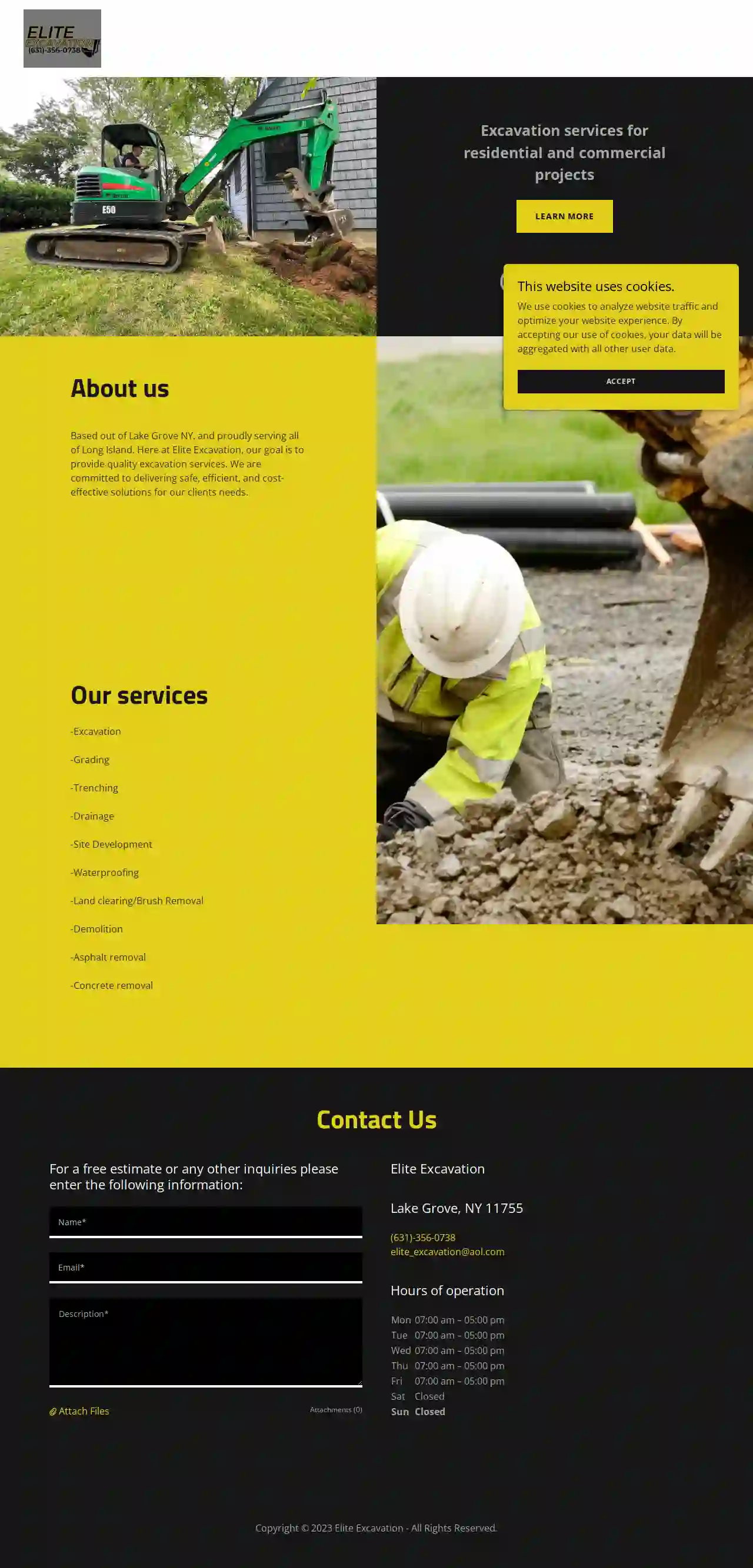
Elite Excavation
51 reviewsLake Grove, NY, 11755, USAbout us Based out of Lake Grove NY, and proudly serving all of Long Island. Here at Elite Excavation, our goal is to provide quality excavation services. We are committed to delivering safe, efficient, and cost-effective solutions for our clients' needs.
- Services
- Why Us?
- Gallery
Get Quote
New Bridge Contracting Corp
52 reviews123 Newbridge Ave, Toronto, M4W 2P3, USAbout Newbridge Contracting Inc. Newbridge Contracting Inc. is a reputable and experienced general contracting company serving the Greater Toronto Area. We are dedicated to providing high-quality construction services for both residential and commercial clients. Our team of skilled professionals is committed to delivering projects on time and within budget, while maintaining the highest standards of workmanship. We understand that building or renovating your home or business is a significant investment. That's why we take a personalized approach to every project, working closely with our clients to ensure their vision is realized. From initial planning and design to final construction and completion, we are with you every step of the way. At Newbridge Contracting Inc., we pride ourselves on our commitment to customer satisfaction. We believe in building lasting relationships with our clients, based on trust, transparency, and open communication. We are confident that you will be pleased with the results of your project.
- Services
- Why Us?
Get Quote
Bombace Construction
58 reviews63 2nd St, New Rochelle, 10801, USExcavating Contractor New Rochelle NY We Make Problems With Your Property Disappear Yard drainage solutions, excavating services, driveway paving, demolitions and hardscaping from a licensed, insured Westchester contractor with over 40 years of experience. Licensed Local Contractor Rest comfortably knowing you’re putting your property in the hands of a licensed contractor with over 40 years experience. Family Owned & Operated As a 4th generation, family owned contractor, we understand how important it is that your property & safety are cared for. You're Always Covered Bombace Construction is fully insured and all of our equipment is operated by experienced professionals that work safely. Worried about hiring the wrong contractor? When you have problems with your yard and need to hire a contractor, it can be overwhelming. Is the contractor licensed in Westchester? Will the contractor take care of your yard? Will your yard be safe when you're having work done? Do they hire skilled workers with the right qualifications? As local homeowners, and lifelong residents of New Rochelle, we get it. Whether you have drainage problems, are repaving your driveway, digging up your yard, or doing other work on your home, there’s a lot riding on it. It’s crucial that you hire a contractor that has the right credentials, and stands by their work. You deserve a qualified contractor that delivers results The Results You Need, Without Having To Worry Bombace Construction is a licensed, insured, family-owned 4th generation excavator and paving contractor in New Rochelle, New York. We’ve been helping residential customers solve problems with your yard, driveway and other exterior needs since 1985.Our experienced excavation & yard drainage experts are equipped to handle your project, large or small. Each property is unique and has considerations to account for. After more than 4 decades of experience, we are able to carefully assess each individual project. With personalized planning, attention to detail, and expert execution we deliver the comfort you need to know the your project will be completed right the first time.Our wide range of services include asphalt paving, land clearing, grading, foundations, debris removal & hauling, yard drainage systems, retaining walls, demolition and landscaping.
- Services
- Why Us?
- Gallery
Get Quote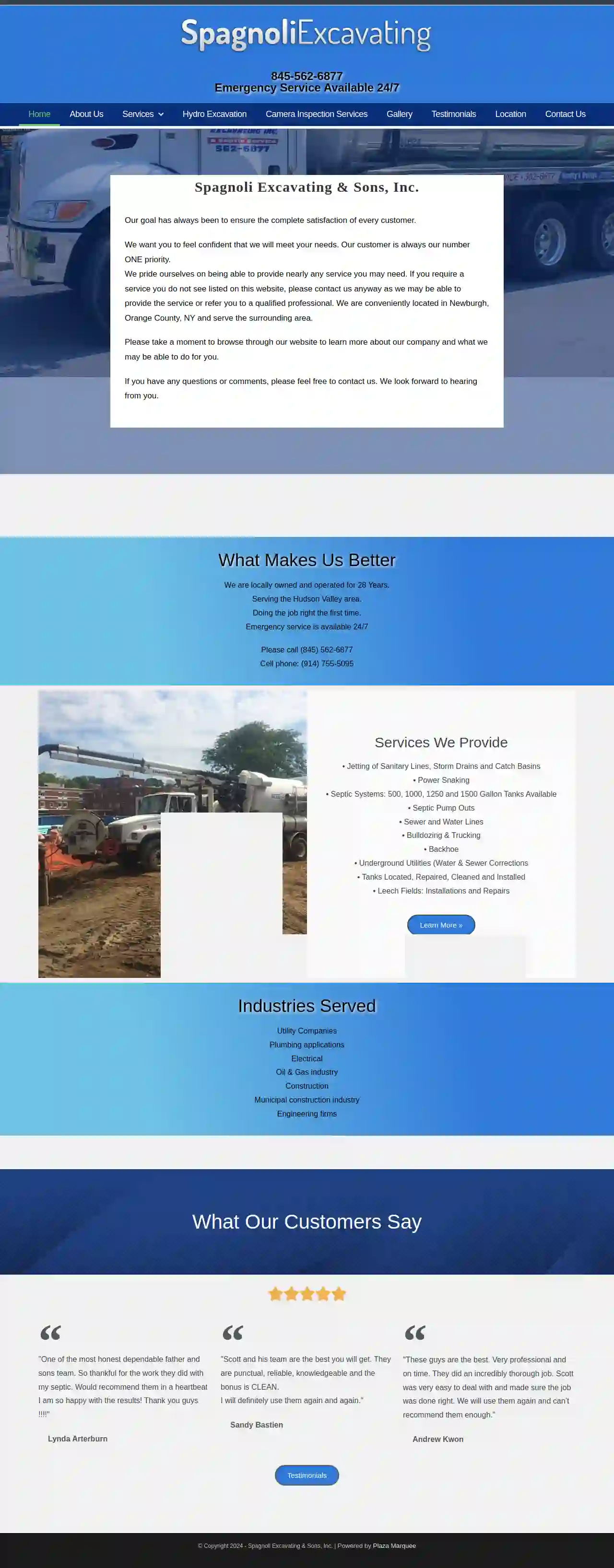
Spagnoli Excavating Inc
517 reviews47 South Plank Road, Newburgh, 12550, USSpagnoli Excavating & Sons, Inc. At Spagnoli Excavating & Sons, Inc., our unwavering commitment is to ensure the complete satisfaction of every customer. We strive to provide you with the confidence that your needs will be met, placing our customers as our top priority. We take pride in offering a wide range of services to cater to your diverse requirements. If you need a service not listed on our website, don't hesitate to contact us. We may be able to assist you or refer you to a qualified professional. Conveniently located in Newburgh, Orange County, NY, we serve the surrounding area. Explore our website to learn more about our company and the services we can provide. Feel free to reach out with any questions or comments. We look forward to hearing from you.
- Services
- Why Us?
- Testimonials
- Gallery
Get Quote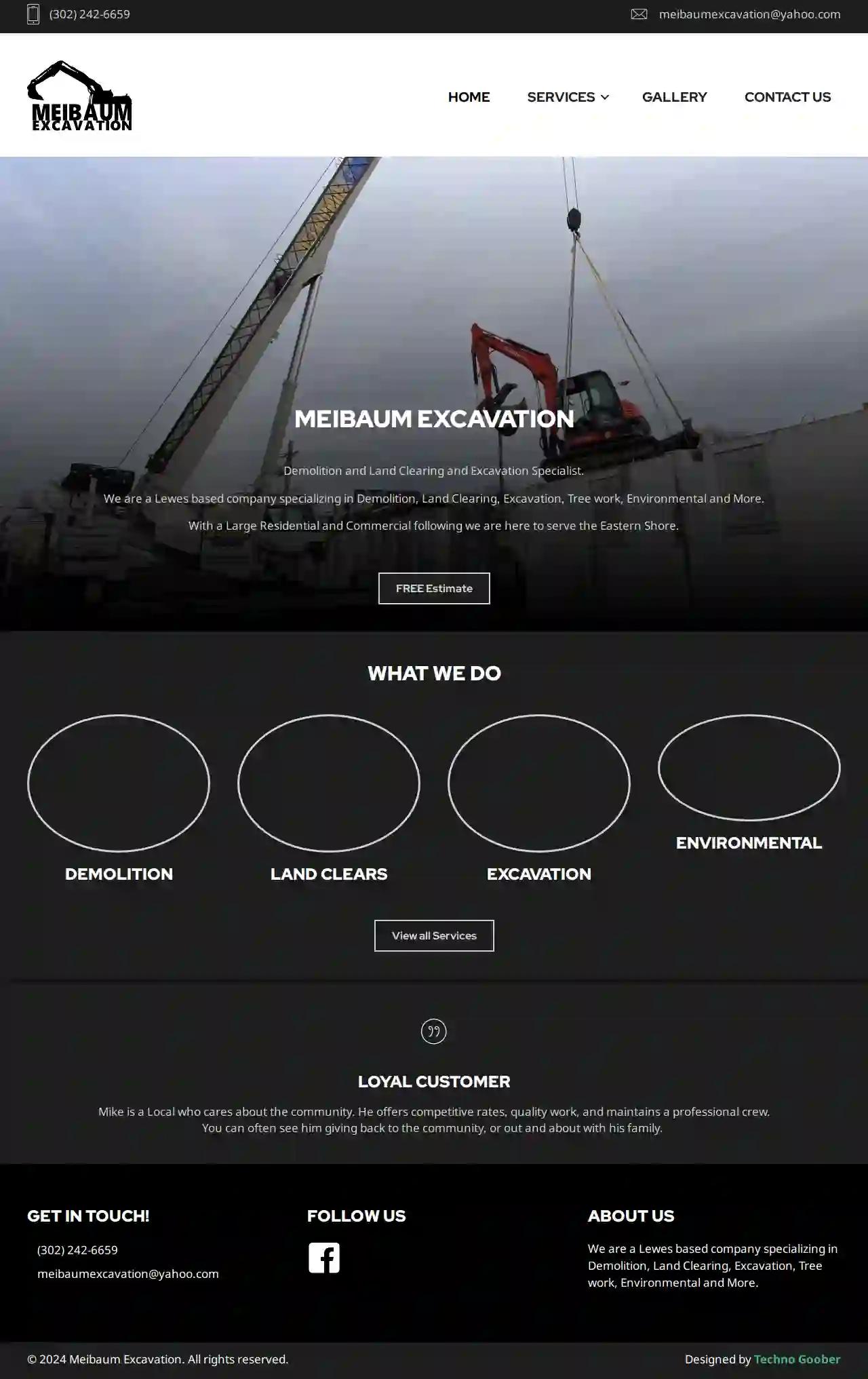
Meibaum Excavation
534 reviewsNew York, USMeibaum Excavation: Your Trusted Partner for Demolition, Land Clearing, and Excavation Meibaum Excavation is a Lewes-based company dedicated to providing top-notch demolition, land clearing, excavation, tree work, environmental services, and more. We have a strong reputation for serving both residential and commercial clients across the Eastern Shore. Our team is committed to delivering high-quality work, competitive rates, and a professional approach. We are proud to be a part of the community and strive to give back whenever possible. Whether you need to demolish a multi-story home, clear land for a new development, or excavate for a basement, Meibaum Excavation has the expertise and experience to handle your project efficiently and effectively. We are committed to safety and environmental responsibility, ensuring that all our work is completed to the highest standards. Contact us today for a free estimate and let us help you bring your vision to life.
- Services
- Why Us?
- Testimonials
- Gallery
Get Quote- Mu
Munson Excavating and Construction
4.210 reviewsBronx, US- Services
- Why Us?
- Gallery
Get Quote 
Triple J Land Services - Dirt Works
52 reviewsHuntsville, USDiscover the Most Trusted Excavation Company in Livingston, TX When it comes to delicate excavation projects in Livingston, TX, there’s only one name you need to know: Triple J Land Services. With a proven track record of reliable experience and exceptional service throughout the greater area, including Madisonville, The Woodlands, Livingston, and College Station, we are the team you can trust with your valuable projects. Revitalize Your Land with Unmatched Excavation Services in Livingston, TX Contact our local excavation and land clearing company serving Livingston, TX and surrounding areas Looking to transform your land in Livingston, TX, and the surrounding areas into something extraordinary? Your search ends here! Triple J Land Services is your ultimate resource, equipped with years of expertise, cutting-edge techniques, and an unwavering commitment to excellence. Since 2008, we have been providing top-quality services such as tree removal, dirt work, and excavation, ensuring every project, regardless of size, is handled with ease and precision. With our specialized crew members, we deliver quick and efficient results while taking care of all necessary permits along the way. Whether you require a stunning onsite pond or cleared roads for a driveway installation, trust us to bring your vision to life. Contact us today for a free estimate!
- Services
- Why Us?
- Testimonials
- Gallery
Get Quote
Bulldog Contracting & Excavating Inc.
528 reviewsNesconset, USNew York's Leading Excavation Company Family Owned & Operated since 1987 Decades of Operational Excellence Since 1987 With a foundation established in 1987, Bulldog Contracting, Inc. boasts a rich history of proficiency in excavation and construction. Our extensive experience ensures clients benefit from a depth of knowledge and skill honed over many successful projects. Integrated Excavation and Construction Expertise Bulldog Contracting, Inc. offers a comprehensive approach, seamlessly combining excavation and construction services. From project commencement to completion, our team's proficiency spans the entire project spectrum, presenting clients with an integrated and efficient solution for their needs. Tailored Financing Solutions for Every Project Acknowledging the diverse financial requirements of our clients, Bulldog Contracting, Inc. provides flexible financing options. Understanding the uniqueness of each project, our commitment to offering customized financial solutions underscores our dedication to realizing your vision without compromising on quality or timelines. Sturdy Foundations - Fully Licensed and Insured Operations Client assurance is paramount. Bulldog Contracting, Inc. operates with complete licensing and insurance, emphasizing our commitment to compliance and safety. This steadfast approach ensures that your investment is safeguarded, and our operations are conducted with the utmost professionalism and accountability. We're Excited to Meet You! Bulldog Contracting is owned by Chris Hembury, a retired NYC police officer. Chris served 20 years in the department including 3 consecutive months after the 9/11 attacks. During that time, he began to learn about the landscaping, construction, and carpentry industry. After retiring from the force he expanded into a full-time construction and excavation business.
- Services
- Why Us?
- Our Team
- Testimonials
- Gallery
Get Quote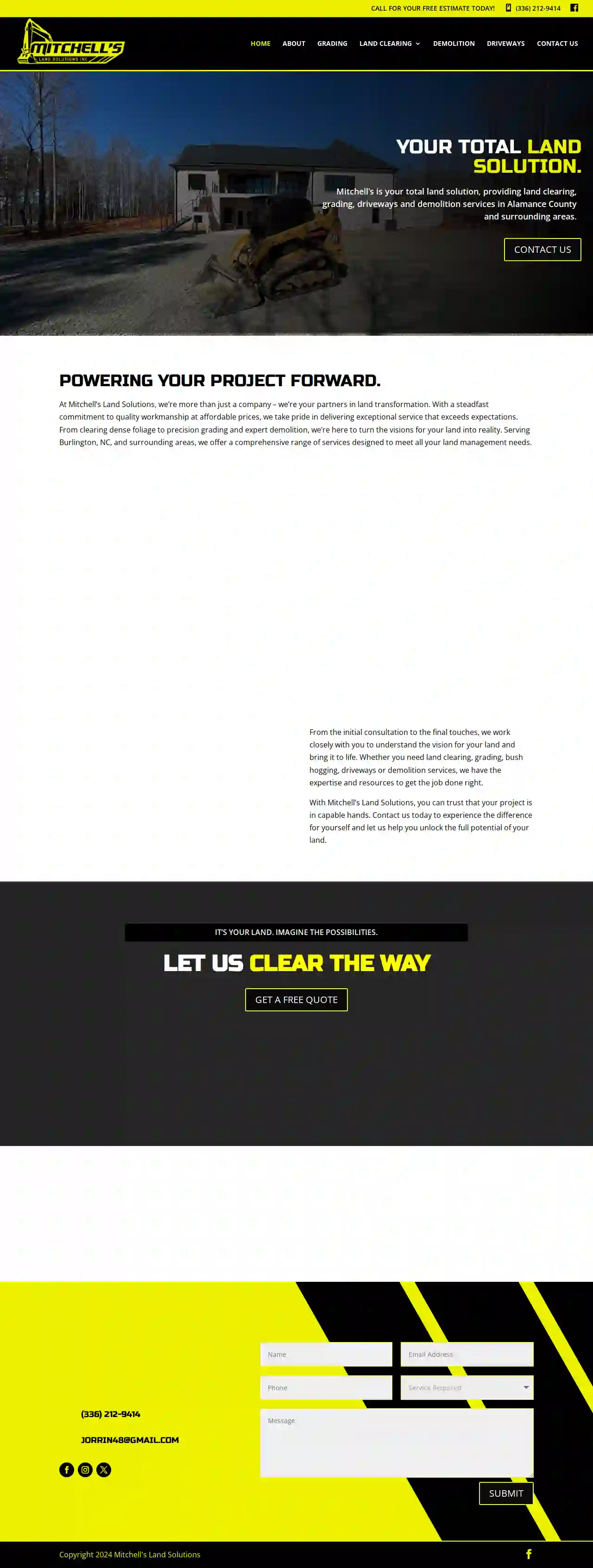
Mitchell's Land Solutions
59 reviewsClay, USYour Total Land Solution. Mitchell’s is your total land solution, providing land clearing, grading, driveways and demolition services in Alamance County and surrounding areas. At Mitchell’s Land Solutions, we’re more than just a company – we’re your partners in land transformation. With a steadfast commitment to quality workmanship at affordable prices, we take pride in delivering exceptional service that exceeds expectations. From clearing dense foliage to precision grading and expert demolition, we’re here to turn the visions for your land into reality. Serving Burlington, NC, and surrounding areas, we offer a comprehensive range of services designed to meet all your land management needs. From the initial consultation to the final touches, we work closely with you to understand the vision for your land and bring it to life. Whether you need land clearing, grading, bush hogging, driveways or demolition services, we have the expertise and resources to get the job done right. With Mitchell’s Land Solutions, you can trust that your project is in capable hands. Contact us today to experience the difference for yourself and let us help you unlock the full potential of your land. It’s Your Land. Imagine the possibilities.
- Services
- Why Us?
- Gallery
Get Quote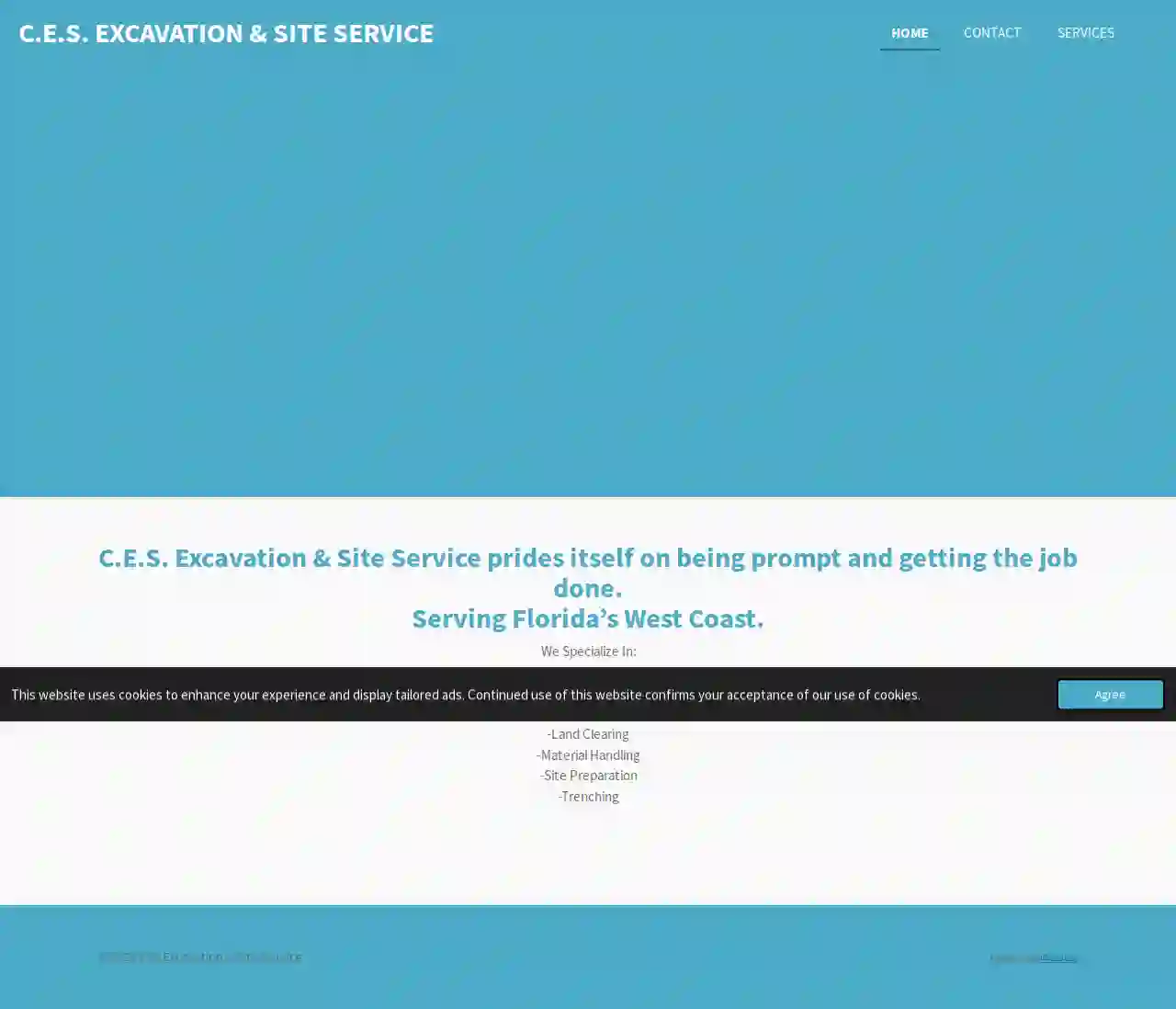
C.E.S. Excavation & Site Service
New York, USAbout C.E.S. Excavation & Site Service C.E.S. Excavation & Site Service is dedicated to providing prompt and efficient service to clients across Florida's West Coast. We take pride in getting the job done right, every time.
- Services
- Why Us?
- Our Team
- Gallery
Get Quote
Over 22,076+ Excavation Contractors in our network
Our excavation pros operate in Hastings-on-Hudson & surroundings!
ExcavationHQ has curated and vetted the Best Excavation Contractors in and around Hastings-on-Hudson. Find the most trustworthy contractor today.
Frequently Asked Questions About Demolition Contractors
- Permits and Regulations: Obtain all necessary demolition permits and comply with local building codes and environmental regulations.
- Contracts: Have a clear and comprehensive contract with the demolition contractor outlining the scope of work, payment terms, and liabilities.
- Environmental Laws: Comply with environmental laws regarding hazardous material removal, waste disposal, and pollution control.
- Neighboring Property Rights: Respect neighboring property rights and take measures to prevent damage or disruption to adjacent properties.
- Worker Safety: Adhere to worker safety regulations and provide a safe working environment for demolition crews.
- 'Can I see proof of your licensing and insurance?' Verify their credentials and coverage.
- 'What experience do you have with projects like mine?' Ensure they have relevant expertise.
- 'Can you provide references from past clients?' Check their reputation and customer satisfaction.
- 'What are your safety protocols?' Prioritize contractors who emphasize safety.
- 'How will you handle hazardous materials?' Ensure they have proper procedures for asbestos or lead abatement.
- 'What is your timeline for completing the project?' Understand the project duration.
- 'How will you manage noise, dust, and debris?' Discuss mitigation measures for minimizing disruption.
- 'What are your payment terms?' Clarify payment schedules and any required deposits.
- Recycling: Concrete, brick, metal, and wood can be recycled and reused in other construction projects, reducing waste sent to landfills.
- Landfill Disposal: Non-recyclable materials are disposed of in designated landfills according to local regulations.
- Donation: Some materials, such as fixtures or appliances, may be suitable for donation to charitable organizations.
What are the legal considerations for demolition projects?
What questions should I ask a demolition contractor before hiring them?
What happens to the debris after demolition?
What is a demolition bond?
What are the legal considerations for demolition projects?
- Permits and Regulations: Obtain all necessary demolition permits and comply with local building codes and environmental regulations.
- Contracts: Have a clear and comprehensive contract with the demolition contractor outlining the scope of work, payment terms, and liabilities.
- Environmental Laws: Comply with environmental laws regarding hazardous material removal, waste disposal, and pollution control.
- Neighboring Property Rights: Respect neighboring property rights and take measures to prevent damage or disruption to adjacent properties.
- Worker Safety: Adhere to worker safety regulations and provide a safe working environment for demolition crews.
What questions should I ask a demolition contractor before hiring them?
- 'Can I see proof of your licensing and insurance?' Verify their credentials and coverage.
- 'What experience do you have with projects like mine?' Ensure they have relevant expertise.
- 'Can you provide references from past clients?' Check their reputation and customer satisfaction.
- 'What are your safety protocols?' Prioritize contractors who emphasize safety.
- 'How will you handle hazardous materials?' Ensure they have proper procedures for asbestos or lead abatement.
- 'What is your timeline for completing the project?' Understand the project duration.
- 'How will you manage noise, dust, and debris?' Discuss mitigation measures for minimizing disruption.
- 'What are your payment terms?' Clarify payment schedules and any required deposits.
What happens to the debris after demolition?
- Recycling: Concrete, brick, metal, and wood can be recycled and reused in other construction projects, reducing waste sent to landfills.
- Landfill Disposal: Non-recyclable materials are disposed of in designated landfills according to local regulations.
- Donation: Some materials, such as fixtures or appliances, may be suitable for donation to charitable organizations.